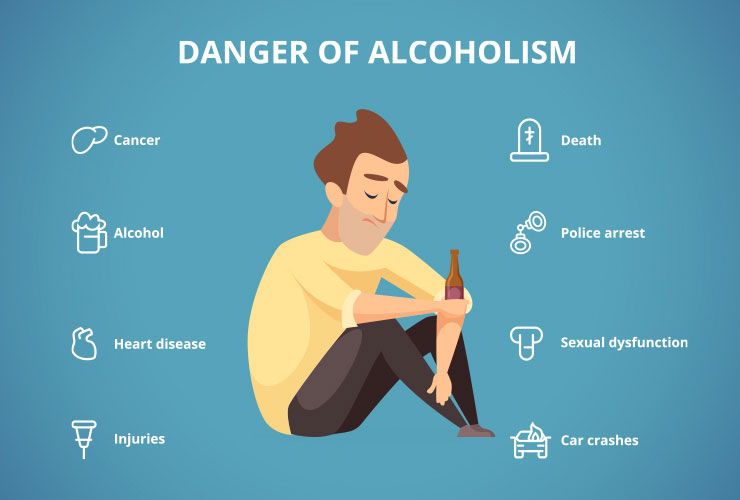If you have a loved one who is struggling with alcoholism, you may be wondering how you can help them. It can be difficult to know what to do, especially if you don’t know much about addiction and recovery. In this blog post, we will provide a guide for family and friends of alcoholics. We will discuss the different things that you can do to support your loved one on their road to recovery.
Contents
- 1 What Is Alcoholism?
- 2 Negative Impacts of Alcoholism
- 3 How To Help Alcoholics?
- 3.1 Encourage Them To Seek Help
- 3.2 Help Them Find Treatment Options
- 3.3 Attend Meetings With Them
- 3.4 Be There For Them
- 3.5 See Their Signs
- 3.6 Do Not Judge Them
- 3.7 Know When To Say
- 3.8 Intervene When You Need To
- 3.9 Listen To Their Problems
- 3.10 Be Prepared For Setbacks
- 3.11 Find Treatment For Them
- 3.12 Be Supportive
- 3.13 Be Patient
- 4 Conclusion
- 5 A Word From Therapy Mantra
What Is Alcoholism?
 Alcoholism is a progressive disease that includes both a physical and psychological dependence on alcohol. It is characterized by an increased tolerance to alcohol, which means that larger amounts of alcohol are needed in order to feel the same effects. Alcoholism can lead to serious health problems, including liver damage, heart disease, and cancer. It can also result in financial problems, job loss, and broken relationships.
Alcoholism is a progressive disease that includes both a physical and psychological dependence on alcohol. It is characterized by an increased tolerance to alcohol, which means that larger amounts of alcohol are needed in order to feel the same effects. Alcoholism can lead to serious health problems, including liver damage, heart disease, and cancer. It can also result in financial problems, job loss, and broken relationships.
It also gives you a great sense of satisfaction to know that you have helped someone get through a difficult time in their life.
Negative Impacts of Alcoholism

There are many negative impacts of alcoholism on both the individual and their loved ones. The most common are health problems, financial problems, and relationship problems.
Health Problems
Alcoholism can cause a number of serious health problems, including cirrhosis of the liver, pancreatitis, heart disease, and stroke. In addition, alcoholics are more likely to contract other diseases such as tuberculosis and pneumonia.
Financial Problems
Alcoholism can lead to financial problems for the individual as well as their loved ones. Alcoholics often have difficulty holding down jobs or maintaining healthy relationships due to their addiction, which can lead to money troubles. Additionally, alcohol is expensive and can quickly drain someone’s finances if they’re not careful. It may also lead to legal troubles if the individual is arrested for drunk driving or public intoxication.
Relationship Problems
One of the most common problems associated with alcoholism is relationship problems. Alcoholics often have difficulty maintaining healthy relationships due to their addiction. They may lose friends, damage family relationships, and have trouble keeping a job. In addition, alcoholics are more likely to be involved in domestic violence. It may be difficult for family and friends to watch these problems play out, but it is important to remember that alcohol is responsible for their own behavior.
Abuse
Sometimes, people who are close to an alcoholic may find themselves in an abusive situation. Alcoholics may become verbally or physically abusive when they are drunk. If you are in an abusive situation, it is important to get help from a friend or family member, or from a professional such as a therapist or counselor. It can be difficult to leave an abusive relationship, but it is important to remember that you are not responsible for the alcoholic’s behavior.
Behavior Changes
There are many behavioral changes that may occur in an alcoholic. They may become more withdrawn, moody, or aggressive. They may also start to neglect their appearance or hygiene. If you notice any of these changes in someone you know, it is important to talk to them about it. It may be difficult to get them to open up, but it is important to try.
How To Help Alcoholics?

There are many ways to help an alcoholic. As a family member or friend, you can offer support and understanding. You can also provide practical assistance, such as helping them find treatment options or attending Alcoholics Anonymous meetings with them. Some of these ways are:
Encourage Them To Seek Help
Sometimes, an alcoholic will need to be encouraged to seek help. This can be a difficult conversation to have, but it is important. You may need to express your concerns and explain how their drinking is affecting you and the relationship. It is also important to be understanding and non-judgmental. The goal is to get them to see that they need help and that you are there for them.
Help Them Find Treatment Options

If the alcoholic is willing to seek treatment, there are many options available. There are inpatient and outpatient programs, 12-step programs, therapy, and medication. You can research these options and help the alcoholic find the right fit for them. You may also need to provide child care while they are in treatment or help them with transportation.
Attend Meetings With Them
If the alcoholic is in Alcoholics Anonymous or another 12-step program, you can attend meetings with them. This can be a great way to support them and also learn more about their recovery process. It can also be helpful to talk to other family members and friends who are in the same situation.
Be There For Them
Recovery from alcoholism is a long and difficult process. It is important to be there for the alcoholic, even when they are struggling. Offer your support and understanding, and let them know that you are there for them no matter what. Sometimes, just being there is the best thing you can do. It can also be helpful to talk to a therapist or counselor about how you are feeling.
See Their Signs
Sometimes, there are warning signs that an alcoholic is slipping back into drinking. There can be a change in their mood, behavior, or appearance. If you see these signs, it is important to talk to the alcoholic about your concerns. They may need more support or a different treatment option. You should also talk to their doctor or therapist.
Do Not Judge Them
 Judging a person often leads to them feeling ashamed and embarrassed. This can make it difficult for them to seek help. Remember that alcoholism is a disease, and the alcoholic is not responsible for their condition. Be supportive and understanding, and let them know that you are there for them no matter what.
Judging a person often leads to them feeling ashamed and embarrassed. This can make it difficult for them to seek help. Remember that alcoholism is a disease, and the alcoholic is not responsible for their condition. Be supportive and understanding, and let them know that you are there for them no matter what.
Know When To Say
There are times when it is best to step back and let the alcoholic deal with their problems on their own. This can be difficult, but it is important to remember that you cannot force them to get help. If they are not ready or willing to seek treatment, there is not much you can do except offer your support. It may be helpful to talk to a therapist or counselor about your situation.
Intervene When You Need To
Intervention is a process where family and friends get together to confront the alcoholic about their drinking. This can be a last resort if the alcoholic is not willing to seek help on their own. Sometimes there are warning signs that an alcoholic is slipping back into drinking. There can be a change in their mood, behavior, or appearance. If you see these signs, it is important to talk to the alcoholic about your concerns. They may need more support or a different treatment option. You should also talk to their doctor or therapist.
Listen To Their Problems
 There are times when it is best to step back and let the alcoholic deal with their problems on their own. This can be difficult, but it is important to remember that you cannot force them to get help. If they are not ready or willing to seek treatment, there is not much you can do except offer your support. It may be helpful to talk to a therapist or counselor about your situation.
There are times when it is best to step back and let the alcoholic deal with their problems on their own. This can be difficult, but it is important to remember that you cannot force them to get help. If they are not ready or willing to seek treatment, there is not much you can do except offer your support. It may be helpful to talk to a therapist or counselor about your situation.
Be Prepared For Setbacks
Recovery from alcoholism is a long and difficult process, and there will likely be setbacks along the way. Be prepared for this and try to remain supportive. It can be helpful to talk to other family members and friends who are in the same situation. You should also talk to a counselor about how you are feeling. It may be difficult, but it is important to remember that you cannot force them to get help. If they are not ready or willing to seek treatment, there is not much you can do except offer your support.
Find Treatment For Them
There are many different types of treatment for alcoholism. The best option depends on the individual and their situation. There are many different types of treatment for alcoholism. The best option depends on the individual and their situation.
You should help the alcoholic find a treatment that is right for them. This may include talking to their doctor or therapist, doing research online, or contacting a local alcohol rehab center.
Be Supportive
 Recovery from alcoholism is a long and difficult process, and there will likely be setbacks along the way. Be prepared for this and try to remain supportive. It can be helpful to talk to other family members and friends who are in the same situation. You should also talk to a counselor about how you are feeling. It may be difficult, but it is important to remember that you cannot force them to get help. If they are not ready or willing to seek treatment, there is not much you can do except offer your support.
Recovery from alcoholism is a long and difficult process, and there will likely be setbacks along the way. Be prepared for this and try to remain supportive. It can be helpful to talk to other family members and friends who are in the same situation. You should also talk to a counselor about how you are feeling. It may be difficult, but it is important to remember that you cannot force them to get help. If they are not ready or willing to seek treatment, there is not much you can do except offer your support.
Be Patient
Patience is key when supporting an alcoholic through their recovery. It is a long and difficult process, and there will be setbacks along the way. Be prepared for this and try to remain supportive. It can be helpful to talk to other family members and friends who are in the same situation. You should also talk to a counselor about how you are feeling. It may be difficult, but it is important to remember that you cannot force them to get help. If they are not ready or willing to seek treatment, there is not much you can do except offer your support.
Conclusion
Alcoholism is a difficult addiction to overcome, but it is possible with the right support system. If you or someone you know is struggling with alcoholism, there are many resources available to help. To overcome alcoholism, it is important to seek professional help, attend support groups, and make lifestyle changes. With the right treatment plan and support system in place, recovery is possible.
If you or someone you know needs help, don’t hesitate to reach out for assistance. There are many resources available to help those struggling with alcoholism. Treatment can be successful if the individual is willing to seek help and make necessary changes. With the right support system in place, recovery is possible. An alcoholic doesn’t have to suffer alone – there is help available. Seek out the resources that can assist you or your loved one on the road to recovery today.
A Word From Therapy Mantra
Your mental health — Your psychological, emotional, and social well-being — has an impact on every aspect of your life. Positive mental health essentially allows you to effectively deal with life’s everyday challenges.
At TherapyMantra, we have a team of therapists who provide affordable online therapy to assist you with issues such as depression, anxiety, stress, workplace Issues, addiction, relationship, OCD, LGBTQ, and PTSD. You can book a free therapy or download our free Android or iOS app.


